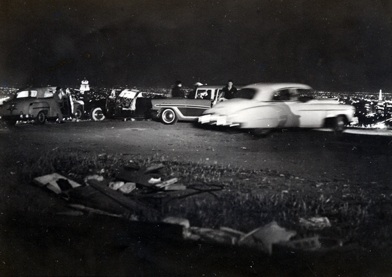Presentations: Ross Lipman

In a revealing thesis on the making of The Exiles, Kent Mackenzie concisely states the film's aim: to document physical reality as a window to human truth. Indeed, despite the film's narrative construct, Mackenzie's collaborators considered The Exiles to be a documentary. Yet the intertwinings of fact and fiction are always complex, and Mackenzie's 1961 work is no exception.
In integrating himself with the Native American community of Los Angeles's Bunker Hill neighborhood over a period of years, Mackenzie positioned himself as at once both outsider and insider - about as "in" as a white man with a camera could get. This position of one who stands both within and without a community neatly mirrors that of the Natives themselves: it firmly places him within the film's central metaphor of Exile. Thus his documentary impulse is highly personalized, and far from objective, as he himself was quick to acknowledge.
The concept of Exile is similarly embedded in the specific tools of the film's making. As a low-budget filmmaker, Mackenzie and his crew used minimal gear and an improvisational approach that enabled the filming of previously undocumentable sites and moments. Yet this very same ‘pre-portable’ equipment yielded poor quality sound, with the result that the film would need to be post-dubbed. This technological exile of sound from image created a film that beautifully rendered verite grit, and a studio soundtrack that--at least on occasion--speaks of a different world.
This tension both underlies The Exiles and underscores its meanings; its disembodied studio sound engaging in a perpetual dance with its photographic documentation of physical reality. This essay analyzes the personalized truth in Mackenzie's "fiction document," as exemplified in its relation between sound and image.
Ross Lipman is an independent filmmaker and film restorationist at the UCLA Film & Television Archive. His many restorations include Charles Burnett’s Killer of Sheep, Kent Mackenzie’s The Exiles, the Academy Award-winning documentary The Times of Harvey Milk, and works by Charlie Chaplin, Orson Welles, Shirley Clarke, Kenneth Anger, and John Cassavetes. He was a 2008 recipient of Anthology Film Archive’s Preservation Honors, and is a two-time winner of the National Society of Film Critics’ Heritage Award. His essays on film history, technology, and aesthetics have been published in numerous books and journals. Lipman’s filmmaking works have screened internationally and been collected by museums and institutions including the Oberhausen Kurzfilm Archive, Budapest’s Balazs Bela Studios, and Munich’s Sammlung Goetz. His most recent film restoration is Barbara Loden’s Wanda, and his most recent original production is the live cinema essay, The Book of Paradise Has No Author.
Kent Mackenzie's 'The Exiles': Re-inventing the Real of Cinema
This presentation is part of the panel entitled Blurred Boundaries: Outsider/Insider Filmmaking and Group Identities, being held on Saturday November 13, 2010 4:00pm - 6:30pm in the Eileen Norris Cinema Theatre.
Left: The Exiles (1961) by Kent Mackenzie
Image courtesy of Milestone FIlms
